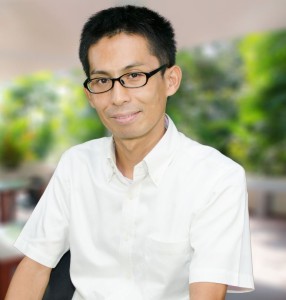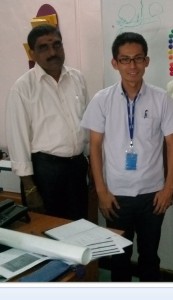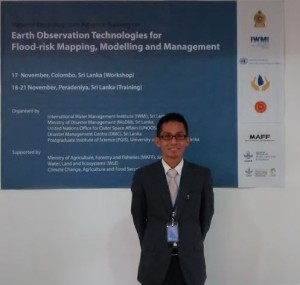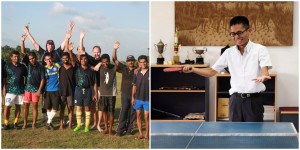Yoshiaki Inada (Yoshi) was seconded to the International Water Management Institute (IWMI) by the Government of Japan, where he worked as a researcher from July 2012. He returned to Japan in early April 2015, at the conclusion of his three-year tenure.
Yoshi has ten years of administrative experience in the irrigation department of the Japanese central and local government, and holds a Bachelor’s degree in agriculture and a Master’s degree in international politics.
Lindha Langa asked him about his experiences at IWMI.

Lindha Langa: What was the purpose of your secondment by the Japanese government to IWMI?
Yoshiaki Inada: The Japanese government sent me to IWMI for two main reasons: the first was to carry out research on how developing and vulnerable countries could adapt to changes in weather brought about by climate change.
I also needed to build up my capacity as a government officer. Experience abroad is a great help to government officers when dealing with international negotiations.
There was a big gap between my research work at IWMI and my job in a government office in Japan. Before coming to Sri Lanka, I was working in Japan as an irrigation project planner with responsibility for project planning that included feasibility assessment. This was mainly a desk job, although I did do some field surveys for irrigation project planning. I enjoyed my work, and felt a sense of fulfilment once a plan was implemented after a long and hard period of preparation.

But it was only after coming to IWMI that I had the opportunity to engage in active research, which I had not done since my graduation. I was able to fine-tune my learning on time and resource allocation for specific research tasks, and improve my budget planning skills.
The Japanese government and IWMI have had a long and cordial relationship since 1991. I’m pleased to say that I kept up these good relations during the three years of my tenure in Sri Lanka and also helped start up the ‘Study on maintenance/ conservation measures of irrigation/ drainage system in coastal and estuary area,’ an IWMI project with the Ministry of Agriculture, Forestry and Fisheries (MAFF) Japan,
Lindha Langa: What were the skills you brought with you to Sri Lanka? Were there any insights you gained in your research at IWMI?
I brought my coordination skills and my ability to liaise effectively with government organizations. I was also experienced in Japanese irrigation/ flood management technology.
During a field visit to the Mundeni Aru river basin in North East Sri Lanka, I visited a sand dam across the river, which was large enough to be observed with digital elevation data derived from satellite. I came to know that the dam was constructed in the dry season and washed away by the first floods in the rainy season every year. This insight was a good example of the importance of field surveys because the information was critical to my work in flood modeling and model validation, and could not be obtained by sitting at a desk.
I also realized, during my field trips, that Sri Lanka has no ‘multipurpose’ dams, which are used both for irrigation and for flood protection. Japan has many such dams, and Sri Lanka should consider developing this structure using Japanese technology. That would be one more positive step towards flood management in Sri Lanka, and closer collaboration between our two countries.
Lindha Langa: What learnings will you take back to Japan?
Yoshiaki Inada: I will take back the research skill I acquired in flood modeling and GIS analyses, which will prove invaluable in my work in Japan, as will my newly- acquired skills in programming. I learned these skills on-the-job with my colleagues, and also from information available on the IWMI website.
Lindha Langa: What do you believe were your most significant achievements in your work in Sri Lanka?
Yoshiaki Inada: I worked with the Ministry of Disaster Management, the Ministry of Irrigation and Water Resources Management and the Sri Lanka Land Reclamation and Development Cooperation, and developed good relations with them.

In November last year, IWMI and partners co-hosted a capacity building workshop on flood –risk mapping, modeling and management at the University of Peradeniya. I led one of the sessions and taught the RADAR (flood damage analysis) tool to 30 participants from various government and development organizations involved in flood management. This, I feel, was a major achievement which brought me a great sense of accomplishment.
Lindha Langa: What did you like most about your work in Sri Lanka?
Yoshiaki Inada: I enjoyed developing the RADAR tool with some Japanese intern students who visited IWMI. RADAR, short for Rapid Agricultural Damage Assessment Routine is a disaster impact assessment tool for agriculture, which asses the short and long-term damage on agricultural systems caused by natural disasters. My colleagues and I applied this method to three countries, Sri Lanka, Myanmar, and Bangladesh. This tool and all data was transferred to participants in training sessions held in Sri Lanka and Bangladesh.
Lindha Langa: What did you most enjoy in Sri Lanka?

Yoshiaki Inada: I enjoyed playing table tennis with IWMI staff and became IWMI’s TT Champion in 2013 and in 2014. I also loved playing soccer as a member of the Japanese soccer team in Colombo, and played a match with them against the IWMI team.
My wife and I loved to travel around Sri Lanka. My wife and son especially love visiting the elephant orphanage in Pinnawala, and climbing the Sigiriya rock. We invited several friends from Japan and traveled around Sri Lanka with them.

